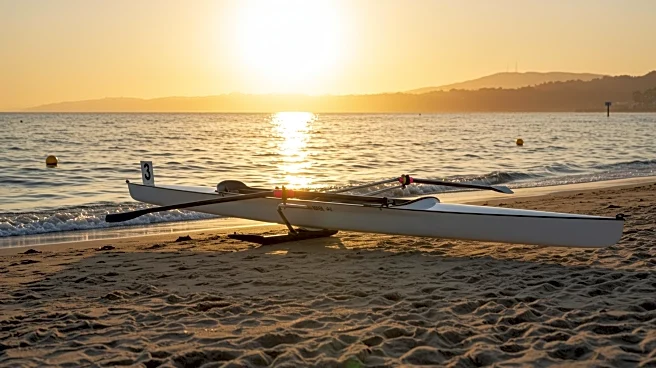What's Happening?
USRowing is preparing athletes for the 2028 Los Angeles Olympics by introducing beach sprints, a new rowing event. This format combines running, rowing, and a dynamic race environment, attracting both seasoned flatwater rowers and newcomers. The event involves athletes running to the waterline, rowing a slalom course, and sprinting back to the finish line. The inclusion of beach sprints aims to engage spectators more directly, as the races occur close to the shore, allowing fans to follow the action closely. The format was developed to make rowing more accessible and exciting for audiences, with the first major international competition held in 2015.
Why It's Important?
The introduction of beach sprints at the 2028 Olympics marks a significant shift in rowing, traditionally a sport with limited spectator engagement. By bringing the races closer to the audience, the event promises to increase interest and participation in rowing. This change could lead to greater visibility for the sport, potentially attracting new fans and athletes. The format also offers a more inclusive opportunity for rowers who may not fit the traditional lightweight category, broadening the scope of competitive rowing. The event's success could influence future Olympic sports planning, emphasizing spectator-friendly formats.
What's Next?
As preparations for the 2028 Olympics continue, USRowing plans to expand training camps and events to familiarize more athletes with beach sprints. The organization aims to create a robust pipeline for U.S. rowers, ensuring strong representation at the Olympics. The LA28 team is also working on sustainability plans, following the precedent set by the Paris Olympics. Stakeholders, including athletes, coaches, and rowing officials, will likely focus on refining the format and logistics to maximize spectator engagement and athlete performance.
Beyond the Headlines
The inclusion of beach sprints in the Olympics could have broader implications for the sport's development. It may encourage innovation in rowing equipment and techniques, adapting to the challenges of coastal conditions. Additionally, the event's success could inspire other sports to consider similar spectator-friendly formats, potentially reshaping the Olympic experience. The focus on sustainability by the LA28 team also highlights the growing importance of environmental considerations in major sporting events.









